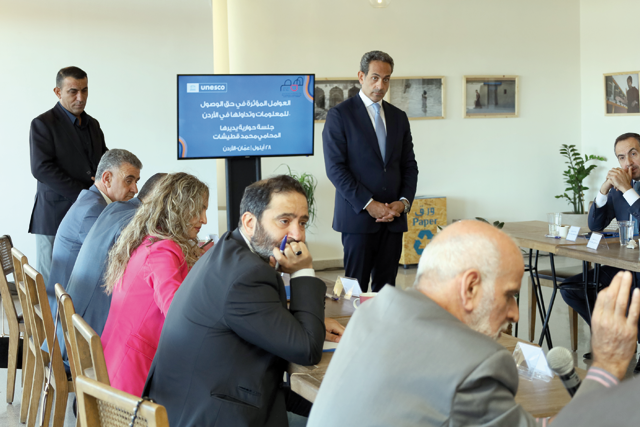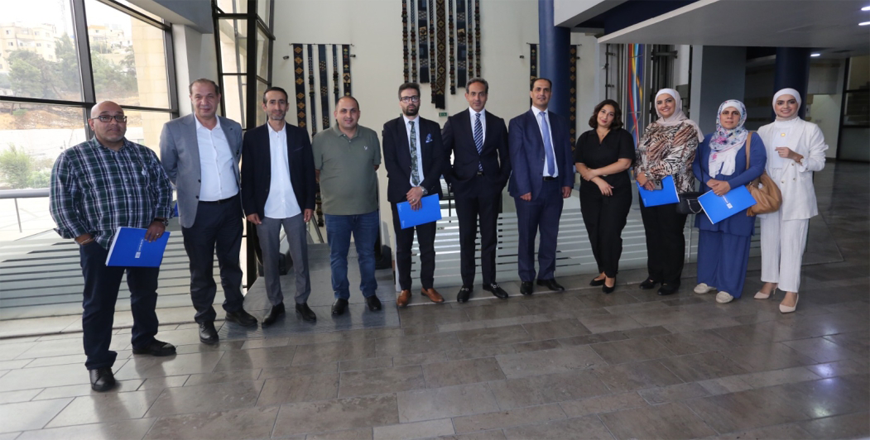You are here
Roundtable explores Right to Information laws
By JT - Sep 28,2022 - Last updated at Sep 28,2022

Participants during a roundtable organised by UNESCO Jordan and HIMAM (The Coalition of Jordanian Human Rights Civil Society Organisations) on Wednesday (Photo courtesy of UNESCO)
AMMAN — UNESCO Jordan and HIMAM (The Coalition of Jordanian Human Rights Civil Society Organisations) on Wednesday organised a roundtable on the occasion of International Day for Universal Access to Information, which falls on September 28.
Experts during the event said that “even strong laws can be ineffective if the officials providing information are undertrained, too few or supporting a culture of secrecy”, according to a UNESCO statement.
Citizens will never be able to play any meaningful role in governance if they do not have access to reliable and quality information, the statement said. When citizens can access key facts and data from governments, it is more difficult to hide abuses of power and other illegal activities and thus governments can be held accountable, read the statement.
The value of access to information is recognised around the world, and there are many countries where, both on paper and in practice, the right to information is a reality, the statement said.
As of February 2022, Access to Information laws have been adopted by 135 countries, with six having passed new laws during the COVID-19 period in between 2020 and 2021.
In 2021, Kuwait and Saudi Arabia joined the list according to UNESCO data. Despite this positive trend, having a law doesn’t necessarily mean that citizens can get important government data in all of these countries, the experts warned.
The roundtable discussion emphasised that complicated bureaucracy can put information out of reach for citizens, who are often unaware that they can even request it.
As well as many laws don’t lead to more informed populations who can call politicians and officials to account, and the Jordanian legislation is not an exception, the statement said.
Findings from the UNESCO surveys in previous years highlighted that many Right to Information laws don’t meet international standards, and not properly implemented and promoted.
The 2021 survey recorded low scores for data availability and number of appeals processed by oversight institutions. Out of the 91 countries and territories, only 57 per cent (52) had data in 2020, while the remaining 43 per cent (39) only had data from either 2018 or 2019, or no data at all.
By sharing specific experiences around the table, the participants aimed to draft strategies which would make access to information implementation and advocacy more effective.
Participants discussed the substantial need to revise the Jordanian Access to Information law so as to bring it into line with international standards and better national practice, and how public bodies in Jordan should take the appropriate steps to implement it properly.
The discussion amplified the message that the connection between Right to Information laws and sustainable development is a “real and fundamental one”.
“The access to information is crucial to effectively respect human rights. In the absence of respect for the right to freedom of information or access to information, human rights abuses take place in secret and impunity flourishes, with this there is no way to expose inefficient government,” Rana Husseini, journalist and human rights activist, said to UNESCO Jordan.
Lawyer and former Director General of the Jordanian Media Commission Mohammed Qutaishat, who facilitated the roundtable discussion, argued that to make Right to Information a reality, several conditions are necessary. A legal and regulatory environment must exist that will lead to emerge an open and pluralistic media sector. Political will support the sector, and rule of law to protect, is must also exist, he said.
Another subject of debate concerning Right to Information has to do with the vital role of civil society and right to information coordinators in pushing for best practice in law reform and implementation.
“A good access to information culture requires the right holders’ engagement. A law could in theory be excellent, but if it is passed in a vacuum and there are no actors willing to put it to good use for the benefit of citizens, then it serves little purpose and will likely wither and die”, highlighted Ikhlas Al Khawaldeh, UNESCO Programme Officer.
Abeer Madanat, the Civil Society Coalition HIMAM Coordinator, believes that civil society plays a prominent role in promoting the right of access to updated, accurate and reliable information, which is crucial for the development of the country.
“Access to information is a crucial right that, if applied according to the international standards, will enhance the trust between the state entities and its citizens, and is the only way to enhance transparency and accountability, in order to fight corruption”, Madanat said.
Throughout the discussion it was agreed that there is a gender gap in the media which affects information provision.
MP Zainab Al Bdoul commented that "women need to become more involved in the media and they should be encouraged to take on managerial roles. If the gender gap within the media is bridged, then the information provided will be more gender responsive”.
In addition, the roundtable pointed out the need for information to be made more accessible to women.
The joint report of the roundtable will collect comments and suggestions for legislative and procedural reform themes or priorities.
UNESCO’s work on access to information has been made possible through the support ofthe Multi-Donor Programme on Freedom of Expression and Safety of Journalists (MDP), said the statement.
Related Articles
AMMAN — Judicial officers, journalists, civil society activists, parliamentarians, lawyers and access to information regulatory bodies joine
AMMAN — Commemorating the International Day for Universal Access to Information (IDUAI), UNESCO Jordan and the Greater Amman Municipality (G
AMMAN — The Planning and International Cooperation draft law of 2023 lacks guidelines regulating the funding of civil society organisations
















